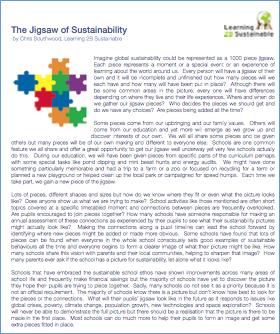 |
 |
 |
||||
 |
||||||
The 'Jigsaw of Sustainability' is a thought provoking and insightful article from Chris Southwood of Learning 2B Sustainable. You can read through the text below or download the piece as a PDF by clicking on the image.
Please respect the intellectual property and copyright of this piece, both of which remain with Chris. We thank her for allowing us to reproduce it for the benefit of the MELA community.
If you would like to sumbit a piece to MELA then send it to us here.
Click below to download
The Jigsaw of Sustainability
by Chris Southwood
Learning 2B Sustainable
Imagine global sustainability could be represented as a 1000 piece jigsaw. Each piece represents a moment or a special event or an experience of learning about the world around us. Every person will have a jigsaw of their own and it will be incomplete and unfinished but how many pieces will we each have and how many will have been put in place? Although there will be some common areas in the picture, every one will have differences depending on where they live and their life experiences. Where and when do we gather our jigsaw pieces? Who decides the pieces we should get and do we have any choices? Are pieces being added all the time?
Some pieces come from our upbringing and our family values. Others will come from our education and yet more will emerge as we grow up and discover interests of our own. We will all share some pieces and be given others but many pieces will be of our own making and different to everyone else. Schools are one common feature we all share and offer a great opportunity to get our jigsaw well underway yet very few schools actually do this. During our education, we will have been given pieces from specific parts of the curriculum perhaps with some special tasks like pond dipping and mini beast hunts and energy audits. We might have done something particularly memorable and had a trip to a farm or a zoo or focused on recycling for a term or planned a new playground or helped clean up the local park or campaigned for speed humps. Each time we take part, we gain a new piece of the jigsaw.
Lots of pieces, different shapes and sizes but how do we know where they fit or even what the picture looks like? Does anyone show us what we are trying to make? School activities like those mentioned are often short topics covered at a specific timetabled moment and connections between pieces are frequently overlooked. Are pupils encouraged to join pieces together? How many schools have someone responsible for making an annual assessment of these connections as experienced by their pupils to see what their sustainability pictures might actually look like? Making the connections along a pupil timeline can lead the school forward by identifying where new pieces might be added or made more obvious. Some schools have found that lots of pieces can be found when everyone in the whole school consciously sets good examples of sustainable behaviours all the time and everyone begins to form a clearer image of what their picture might be like. How many schools share this vision with parents and their local communities, helping to sharpen that image? How many parents ever ask if the school has a picture for sustainability, let alone what it looks like?
Schools that have embraced the sustainable school ethos have shown improvements across many areas of school life and frequently make financial savings but the majority of schools have yet to discover the picture they hope their pupils are trying to piece together. Sadly, many schools do not see it as a priority because it is not an official requirement. The majority of schools know there is a picture but don’t know how best to look for the pieces or the connections. What will their pupils’ jigsaw look like in the future as it responds to issues like global crises, poverty, climate change, population growth, new technologies and space exploration? Schools will never be able to demonstrate the full picture but there should be a realisation that the picture is there to be made in the first place. Most schools can do much more to help their pupils to form an image and get some extra pieces fitted in place.
After all, why should we expect them to change anything if all we give them is a bag of bits?
Chris Southwood
© Learning 2B Sustainable Ltd August 2011
See an article from Chris 'Climate of Change in Education' that appeared in the TES on 30 September 2011

